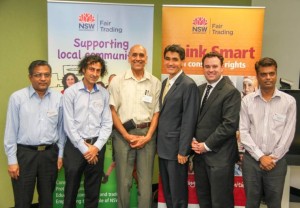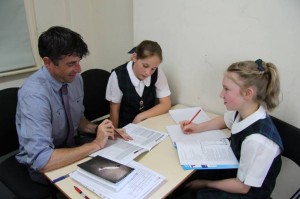ATA sets a benchmark on tutoring
Mohan Dhall, CEO Australian Tutoring Association (second from left) with Geoff Lee MP and Fair Trading Minister Mr Stuart Ayres and members of the Indian community
By Neena Badhwar
Sending our kids to tutoring so that they can get good marks in school and HSC is something that Indian parents aspire, stress and support. At times one can be seen carting children from one tutor to another, at times four subjects a week, so that their child can score a high ATAR rank. They spend thousands of dollars to get their children into selective schools when they are as young as 10 years old.
It is most important for Indian families that their children perform well and get into the courses and careers of their choice.
It may be that tuition may help students score better but warns Fair Trading Department that one must be careful when paying thousands of dollars to tutoring colleges or private tutors.
As children go back to school Fair Trading Minister Stuart Ayres reminded parents and students about the potential pitfalls when signing up for tutoring products and services, saying that Australian Tutoring Association, a body set up to accredit and register coaching schools and colleges and individual tutors, had received 18 complaints involving the tutoring industry in 2013.
Says Mohan Dhall, CEO of Australian Tutoring Association and teacher of Legal Studies at Presbyterian Ladies College, Croydon who also runs a tutoring college at PLC after school hours, “It was about ten years ago when I was tutoring a Russian girl when she started to cry and said that she had learnt with me in one hour that she had not learnt in a years? tutoring for which her parents had spent $3000.”
This revelation encouraged Mohan to investigate the industry. He then approached Standards Australia with his concerns about the industry, suggesting that body consider a national standard. Standards Australia conducted a national survey and on the basis of that convened a working group with the purpose of boosting national standards. However several business and tutoring agencies tried to undermine the process. Two of these agencies still operate in the tutoring market today. Following this, the government of NSW suggested that the industry should self-regulate so Mohan set up the ATA which could set a benchmark, a standard that could be applied to tutoring and tutoring colleges. “At that time very few showed interest in accreditation and either the tutoring colleges self regulate or be open to regulation by the government.”
“So we set up the Australian Tutoring Association. In 2005 we started with five members but now ATA is the biggest body in the world with over 530 businesses listed on our website.”
The membership is open to all and before anyone joins they must read the code of conduct and are legally bound by the contract.
“They can display the ATA membership, its logo and people can ask whether they are accredited by the ATA thus helping the consumers to an accountable practices followed by the tutoring colleges,” says Mohan.
“We have three kinds of membership: A. Registered Businesses B. Registered teachers and C. Retired but qualified people and university students who run tuition classes.”
ATA helps its members in case of any disputes or complaints by students or their parents.
“We help in dispute resolutions and we even do it for non-members.”
“Our members know that they cannot make misleading claims in advertising or overstating the achievements of their students because, says Mohan, “any achievement by a student is not just how the tutoring college contributed but also the credit should go to where it is due such as the family, the school and the teacher. I am not disputing the excellent role of tutors yet the claim should be more honest, transparent and not something that is misleading or likely to deceive.”
The ATA works with Fair Trading and the Department of Education so that consumers understand exactly how we work. It has helped us set standard of tutoring that is higher than anywhere in the world, believes Mohan, “responsible tutoring helps children to get inclusion and does not just make rich children more rich.”
Students being tutored at the Extension Centre, by tutor Dr Adam Pike
“We want quality education and education for all particularly those who can least afford because I believe that education is the right of every child,” Mohan says.
ATA also plans to offer scholarships and has been recently given a research grant to trial a system of ”˜Literacy and Numeracy Scholarships’ for disadvantaged children.
Short URL: https://indiandownunder.com.au/?p=3125


